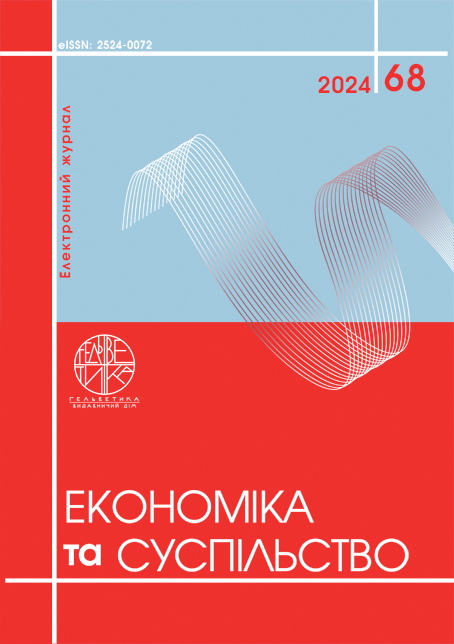PERSONAL FACTORS OF LIFE SATISFACTION AND THEIR IMPACT ON DECISION-MAKING IN THE CONTEXT OF ENSURING THE STAFF STABILITY OF COMPANIES IN WARTIME
Abstract
The article explores the impact of personal factors of life satisfaction on decision-making in the context of ensuring of staff stability of companies in wartime. The war in Ukraine has caused a significant shortage of human resources across various sectors of the economy. This disrupts staff stability, affecting aspects such as recruitment, retention, and development, as well as outsourcing, layoffs, and staff replacement processes. Employee life satisfaction is a key factor in maintaining staff stability. It influences productivity, loyalty, and both the psychological and physical well-being of employees, enabling increased productivity, reduced staff turnover, improved workplace climate, enhanced adaptation processes in crisis situations, lowered stress and illness levels, heightened loyalty to the company, and improved corporate culture parameters. Based on empirical research, it was found that the majority of respondents (on average, about 60%) have a "below average" level of life satisfaction. This may be due to the impact of external stress factors (war, internal displacement, emigration) and internal factors (anxiety about the future, professional demands, low wages, etc.). A relationship was identified between life satisfaction factors and coping strategies in decision-making. People who are actively engaged in life tend to use a productive decision-making style called "vigilance," while those dissatisfied with their lives, who feel disillusioned, fatigued, and anxious about the future, are more likely to choose unproductive coping strategies such as avoidance, procrastination, and hyper-vigilance. Income level has a positive correlation with life satisfaction: the lower the income, the less satisfaction a person feels with life. The practical value of this study lies in substantiating the need to ensure the mental health and well-being of employees to improve staff stability, productivity, effectiveness, and loyalty. Recommendations are provided on how to enhance staff stability by improving life satisfaction factors in the face of external stressors.
References
Безугла Т.В. Термінологічний зміст поняття "стабільність персоналу" та його співвідношення з суміжними поняттями предметної сфери. Моделювання регіональної економіки. 2018. № 1(31). С. 196–205.
Вартанова О.В., Повзун Д.І. Формування кластеру резильєнтності персоналу в структурі моделі компетенцій як умова формування стійкості персоналу підприємства в умовах війни. Журнал стратегічних економічних досліджень. 2024. № 1. С. 58–68. URL: https://www.researchgate.net/publication/381658514_FORMUVANNA_KLASTERU_REZILENNOSTI_PERSONALU_V_STRUKTURI_MODELI_KOMPENCIJ_AK_UMOVA_FORMUVANNA_STIJKOSTI_PERSONALU_PIDPRIEMSTVA_V_CASI_VIJNI (дата звернення: 10.10.2024)
Савченко О., Корват Л., Лавриненко Д. (2024). Винахідливість як важливий показник особистого благополуччя. From: Well-Being Across the Globe: New Perspectives, Concepts, Correlates and Geography. Edited by Mullings, J., Paul, T., Dunn, L et al. Sustainable Development. 288 р. DOI: https://doi.org/10.5772/intechopen.104197 (дата звернення: 11.10.2024)
Савченко О., Калюк О. Методика діагностики когнітивних аспектів суб’єктивного благополуччя особистості. Організаційна психологія. економічна психологія. 2022. № 1(25). С. 89–101. DOI: https://doi.org/10.31108/2.2022.1.25.10 (дата звернення: 12.10.2024)
Ruggeri, K., Garcia-Garzon, E., Maguire, Á. et al. Wellbeing is more than happiness and life satisfaction: a multidimensional analysis of 21 countries. Health and Quality of Life Outcomes, 2020. 18 (1), 192–198.
Ruggeri, K. et al. Well-being is more than happiness and life satisfaction: a multidimensional analysis of 21 countries. Health and Quality of Life Outcomes. 2020. 18(1). DOI: https://doi.org/10.1186/s12955-020-01423-y
Карамушка Л., Креденцер О., Терещенко,К. Суб'єктивне благополуччя освітянського персоналу в умовах війни. Організаційна психологія. Економічна психологія. 2023. № 30(4). С. 23–33. DOI: https://doi.org/10.31108/2.2023.4.30.3 (дата звернення: 13.10.2024)
Mann L., Burnett P., Radford М. & Ford S. (1997) The Melbourne Decision Making Questionnaire: An instrument for measuring patterns for coping with decisional conflict. Journal of Behavioral Decision Making, 10(1), 1–19.
Savchenko O. & Lavrynenko D. Short multidimensional questionnaire of prosperity "PERMA-PROFILER": adaptation of the methodology and its psychometric properties. Psychology of personality, 2023. 52, 167–177. URL: http://habitus.od.ua/journals/2023/52-2023/29.pdf (дата звернення: 14.10.2024)
Savchenko О. Consciousness and reflection in the basis of psychological theorizing. Psychology & Society, 2018. 3–4, 67–89.
Bezuhla T.V. (2018). Terminolohichnyi zmist poniattia "stabilnist personalu" ta yoho spivvidnoshennia z sumizhnymy poniattiamy predmetnoi sfery [Terminological content of the concept of "personnel stability" and its relationship with related concepts of the subject sphere]. Modeliuvannia rehionalnoi ekonomiky, 1(31), 196–205.
Vartanova O., Povzun D.( 2024). Formuvannia klasteru stiikosti personalu v strukturi modeli kompetentnostei yak umova formuvannia stiikosti personalu pidpryiemstva v umovakh viiny [Formation of the Personnel Resilience Cluster in the Structure of the Competence Model as a Condition for the Formation of Enterprise Personnel Resilience in Wartime]. Zhurnal stratehichnykh ekonomichnykh doslidzhen, 1, 58–68. Available at: https://www.researchgate.net/publication/381658514_FORMUVANNA_KLASTERU_REZILENNOSTI_PERSONALU_V_STRUKTURI_MODELI_KOMPENCIJ_AK_UMOVA_FORMUVANNA_STIJKOSTI_PERSONALU_PIDPRIEMSTVA_V_CASI_VIJNI (accessed: 10.10.2024)
Savchenko O., Korvat L. & Lavrynenko D. (2024). Resourcefulness as an Important Indicator of Personal Well-Being. From: Well-Being Across the Globe: New Perspectives, Concepts, Correlates and Geography. Edited by Mullings, J., Paul, T., Dunn, L et al. Sustainable Development. 288 Р. DOI: https://doi.org/10.5772/intechopen.104197 (accessed: 11.10.2024)
Savchenko, O., & Kaliuk, O. (2022). Metodyka diahnostyky kohnityvnykh aspektiv subiektyvnoho blahopoluchchia osobystosti Methods for diagnosing cognitive aspects of subjective well-being of an individual. Orhanizatsiina psykholohiia. ekonomichna psykholohiia, 1(25), 89–101. DOI: https://doi.org/10.31108/2.2022.1.25.10 (accessed: 12.10.2024)
Ruggeri, K., Garcia-Garzon, E., Maguire, Á. et al. (2020). Wellbeing is more than happiness and life satisfaction: a multidimensional analysis of 21 countries. Health and Quality of Life Outcomes, 18 (1), 192–198.
Ruggeri, K. et al. (2020). Well-being is more than happiness and life satisfaction: a multidimensional analysis of 21 countries. Health and Quality of Life Outcomes. 18(1). DOI: https://doi.org/10.1186/s12955-020-01423-y
Karamushka, L., Kredentser, O., Tereshchenko, K. (2023). Subiektyvne blahopoluchchia osvitianskoho personalu v umovakh viiny Subjective well-being of educational personnel in the conditions of war. Orhanizatsiina psykholohiia. Ekonomichna psykholohiia, 30(4), 23–33. DOI: https://doi.org/10.31108/2.2023.4.30.3 (accessed: 13.10.2024)
Mann L., Burnett P., Radford М. & Ford S. (1997) The Melbourne Decision Making Questionnaire: An instrument for measuring patterns for coping with decisional conflict. Journal of Behavioral Decision Making, 10(1), 1–19.
Savchenko O. & Lavrynenko D. (2023). Short multidimensional questionnaire of prosperity "PERMA-PROFILER": adaptation of the methodology and its psychometric properties. Psychology of personality, 52, 167–177. Available at: http://habitus.od.ua/journals/2023/52-2023/29.pdf (accessed: 14.10.2024)
Savchenko О. (2018). Consciousness and reflection in the basis of psychological theorizing. Psychology & Society, 3–4, 67–89.

This work is licensed under a Creative Commons Attribution 4.0 International License.


